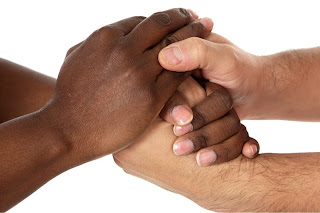This is most typically the way in which we define racism. Personal meditated racial oppression can be both intentional and unintentional; both omission and commission. It manifests itself as lack of respect (in poor or no service; failure to communicate options), suspicion (shoplifting vigilance; everyday avoidance, not limited to but including street crossing, purse clutching, locking doors, standing when there is an available seat next to minority), devaluation (surprise at competency, stifling aspirations) , scapegoating, and dehumanizing (police brutality, sterilization abuse, hate crimes).
It is extremely hard for whites to recognize two other forms of racial oppression which is what I want to discuss. Institutionalized Racial Oppression and Internalized Racial Oppression which stems from the former. One of the reasons these two are so difficult to teach is because for the most part they go unnoticed by the majority culture. There is not a particular antagonist who we can point to and oppose because these issue lie deep below the surface.
Institutionalized Racial Oppression is defined as people having different access to goods, services, and opportunities of society by race. It is normative, often legalized and manifests itself as inherited disadvantage. Again it is structural having been codified in our institutions of custom, practice, and law, so there is no single identifiable perpetrator. It is often evident as inaction in the face of need. It also operates in both material conditions and access to power.
The material conditions affect quality education, sound and safe housing, gainful employment, appropriate medical facilities, and clean environment. The access to power includes differential access to historical information (for example my wife was tracing her family tree but had to stop because no information is available pre-civil war because blacks were not given birth certificates) resources (including wealth and organizational infrastructure), voice (including voting rights, the ability to shape the country's decisions in which they live in...as well as control in the media)
The impacts are great. The association between the socioeconomic status and race in the US has its origins in discrete historical events but yet persists due to contemporary structures that perpetuate those historical prejudices. Race and socioeconomic status are directly correlated and upheld by systems. In the current historical curriculum taught in most affluent public schools little information is written on slavery, segregation, forced integration, blockbusting or the entire Civil Rights era. This means that for the most part people remain completely ignorant to the past challenges and structural limitations that urban people of color face.
For example just take a look at the statistics on how much typically that whites leave to their children in trust funds and inheritances, then look at blacks who for generations were not allowed to own property, invest in the predominately white systems, and how few business loans were given to people of color a few decades ago. All of this has created systems placing blacks far behind whites in the ability to create capital through networking and business creation.
What stems from poor schools, poor social structures and systemic racial oppression is a horrible mindset for many urban poor blacks. This mindset is what I call Internalized Racism Oppression which is defined as acceptance by members of the stigmatized races of negative messages about their own abilities and intrinsic worth. It is characterized by their not believing in others who look like them, and not believing in themselves. For example in our life on life mentoring program one parent was shocked that a person of color was going to be mentoring their child. They asked me specifically for a white mentor believing that a person of color had nothing to offer their child in the way of encouragement, networking and skill.
It involves accepting limitations to one's full humanity, death of aspirations and dreams, self-determining capabilities, one's allowable range of self expression. It also manifests itself in embracing another culture as superior (use products for hair straightening, bleaching of skin, self-devaluation (use of nicknames, rejection of historical ancestry and culture (assimilationalist- the only way to be successful is to act white and completely embrace the majority culture).
The impact is a resignation to ghetto nihilism, helplessness and hopelessness (dropping out of school, failing to vote, engage in risky practices-selling drugs, using drugs, sexual promiscuity).
So there is the problem but what are the solutions? This blog doesn't afford me the time to share the various solutions but I will give just one: Genesis 1:26-27. People of color as well as whites need to go to back to the beginning of creation where God made man in his image and likeness. Every single human being is fearful and wonderfully made by a Creator who shows no partiality even though for centuries His church did. Pastors and churches need to convey a message of gospel hope that when Jesus came and died for the sins of world part of his cosmic plan was to reconcile all people groups to Himself. Understanding your position before God as a hopeless sinner in desperate need for a Savior and Redeemer levels the playing field. It causes the wealthy to boast in their humiliation and the poor to exalt in their position that they are indeed equal in God's eyes. As men and women are humbled they seek to serve the kingdom as a reconciler conscious of the gross sins that were committed and offer repentance where it is needed and forgiveness where it is needed.
In the end the thorns and thistles of racial oppression has put a definite negative mark on the people of God but through the cross we can shed our superiority and inferiority complexes and come to a Savior who makes all things new. Lord I pray that we would all, both black and white, rich and poor, become instruments of reconciliation sensitive to the need but aware of our own prejudices and flaws. It is only through humbling oneself and learning from the past that we can effectively move forward.
Grace and Peace,
JW


